High-Impact Practices
From Hood Magazine’s spring 2020 article, Corde et Mente et Manu: The Essence of High-Impact Practices, explore these alumni stories.
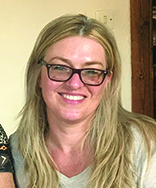 Quill, a high school French teacher, studied abroad in Strasbourg, France, during her time at Hood and now takes her own students abroad to Quebec every year and France every three to four years.
Quill, a high school French teacher, studied abroad in Strasbourg, France, during her time at Hood and now takes her own students abroad to Quebec every year and France every three to four years.
What HIP had the most impact on you as a student?
Without a doubt my time as an exchange student in Hood's Strasbourg program had the most impact on me. It had an immediate impact, and enduring effects.
How did your HIP impact you or help you get to where you are today?
I found myself in another culture and separated from everything I knew. I had to find a center, a core of my self-esteem and identity. It was a huge shock to my system, beyond anything I experienced when I moved from Georgia to go to college in Maryland. I learned how to stand on my own two feet, how to establish myself in a community and how to relate to another culture. I found that I possessed the ability to thrive in a foreign environment and to adapt with flexibility and joy. My experiences eating meals with my host family helped me to appreciate cuisine on a new level. As an educator, I draw on this experience every day. I do not know if I can put into words the profound and enduring impact of living in another country. I believe that everyone should experience it at least once.
Why do you believe it’s important for all students to have access to HIPs?
I take students to Quebec every year and to France every three to four years. While the visits are short, they are deeply meaningful. These experiences cement my belief that there is no better career than being an educator. They are the most life-altering learning experiences I can give to a student. They are never forgotten, and almost always become a point of reference by which students approach anything regarding culture and travel. I have lost track of the number of students who have come back to see me and have mentioned our trips.
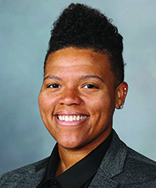 In her role at the Mayo Clinic as a master’s level psychologist, Sledd helps adults transition from emergency psychiatric hospitalization back into day-to-day life. She’s also a beertender at Little Thistle Brewing Company in Rochester, Minnesota. During her time at Hood, she participated in the Honors Program, which allowed her to create her own seminar on food and culture around the world. She also studied abroad in Berlin, Germany.
In her role at the Mayo Clinic as a master’s level psychologist, Sledd helps adults transition from emergency psychiatric hospitalization back into day-to-day life. She’s also a beertender at Little Thistle Brewing Company in Rochester, Minnesota. During her time at Hood, she participated in the Honors Program, which allowed her to create her own seminar on food and culture around the world. She also studied abroad in Berlin, Germany.
What HIP had the most impact on you as a student?
I have a tie between two HIPs during my time at Hood. I was fortunate to be able to participate in the Honors Program throughout my time and enjoyed having professors who encouraged discussion, creativity, and group work among individuals in the course. We were able to create our own final seminar, which was amazing to have that much say in one’s educational experience. The one I chose was on food and culture around the world. The other HIP was my study abroad experience to Berlin, Germany. Although I left for this trip on the day of my graduation, it was my first ever trip “alone” to a new country.
How did your HIP impact you or help you get to where you are today?
The HIPs impacted me most by being able to appreciate, learn, explore and be curious about the world around me; both from a personal and professional standpoint. I learned to be unafraid of trying something new, being able to fail at something the first time and expressing my opinion with authenticity while knowing my own worth.
What was the best or most important thing you learned?
There is more to this world than just you. Absorb all you can, be a lifelong learner, and if you think you're the smartest person in the room, you’re in the wrong room.
Why do you believe it’s important for all students to have access to HIPs?
It enhances their perspective to see beyond whatever bubble of the world they have been in. Exploring new places, meeting new people, and gathering more information about the world is what life is all about to me.
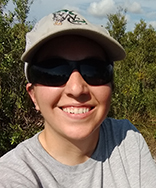 Horn participated in Hood’s coastal studies program; interned with Associate Professor Eric Annis, Ph.D., studying the rusty crayfish; and completed a research project with Associate Professor Eric Kindahl, Ph.D., on salamanders at Piney Branch Nature Center. After graduation, Horn worked in seasonal research, which took her to nine states during the first five years of her career. Now, she’s running a wildlife management area called Okaloacoochee Slough for the Florida Fish and Wildlife Conservation Commission where she manages approximately 8,500 acres of land.
Horn participated in Hood’s coastal studies program; interned with Associate Professor Eric Annis, Ph.D., studying the rusty crayfish; and completed a research project with Associate Professor Eric Kindahl, Ph.D., on salamanders at Piney Branch Nature Center. After graduation, Horn worked in seasonal research, which took her to nine states during the first five years of her career. Now, she’s running a wildlife management area called Okaloacoochee Slough for the Florida Fish and Wildlife Conservation Commission where she manages approximately 8,500 acres of land.
What HIP(s) had the most impact on you as a student?
When I was a sophomore I participated in the Coastal Studies program. The following summer I received an internship with Dr. Annis studying the rusty crayfish. Finally, in my senior year I did a research project with Dr. Kindahl on salamanders at Piney Branch Nature Center. The crayfish internship with Dr. Annis was the most impactful. I had gotten a taste of field work with small projects here and there with the Coastal Studies semester, I was pretty sure that I wanted to do hands in work but didn't get the opportunity to do it every day until I worked with Dr. Annis.
How did your HIP impact you or help you get to where you are today?
I had recommendations from professors that I had worked with. Ron Albaugh (instructor of biology) and Dr. Drew Ferrier (professor of biology) could attest to my team work skills thanks to the coastal studies program, Dr. Annis could talk about my practical experience in regards to field work, and Dr. Kindahl could talk about how I developed a project where I wrote the protocol, carried out the field work and analyzed the data at the end. Having such broad experiences and enthusiastic professors really helped me enter the job market in a strong way. Personally, I learned a lot about myself. Field work is tough; there are rarely easy office days. I learned how to keep a positive attitude even when standing waist deep in a river while it rains on you. I learned that not everyone is going to think getting stuck in a muddy marsh is fun and that it’s okay to listen to their frustrations, even when you thought it was the best day ever. I found out that I’m a lot tougher than I thought I was, and that gave me confidence in my first job outside of Hood, which was the most physically demanding job I have ever had to this day. There is a lot of self-reflection and personal growth when you go through these programs that shape you into a more mature and experienced person for the job.
What was the best or most important thing you learned?
I learned that I was making the right decision in my field of study. I had a blast working in the field everyday. There wasn’t a single day that I was bored or wanted to quit. I wanted to work on more projects and get my hands even more dirty. It really helped narrow my focus when I was applying for jobs. I was looking for something that would put me outside every day, and I was able to find the perfect starting job when I graduated.
Why do you believe it’s important for all students to have access to HIPs?
It gives you a chance to test your field of interest before you graduate. This is especially important in my field where people may not realize how physically demanding and independent the work can be. I have seen interns drop out of an internship the second day because they didn't realize they would have to hike through the Ozarks by themselves to study birds. They thought they would be counting birds while walking through mowed grass or sitting on a porch. And that's ok for them to leave or change their focus on school. The job market is competitive enough that there are back up candidates that will take their place. Realizing what the job you are training for in school entails helps you make better decisions about your future. It's better to change your degree and graduate a year late than go through four years and have to return for another three.
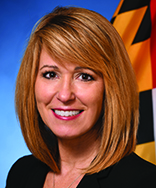 When Schulz arrived at Hood, she was planning to go to law school, but after an internship got her involved with campaign work for a mayoral and Board of Aldermen race in Frederick City, she decided to pursue a career in politics.
When Schulz arrived at Hood, she was planning to go to law school, but after an internship got her involved with campaign work for a mayoral and Board of Aldermen race in Frederick City, she decided to pursue a career in politics.
What HIP had the most impact on you as a student?
When I enrolled in Hood College in the fall of 2004 to complete my B.A. in political science, I was planning to go on to law school. Since I was new to the area, I didn’t really know anyone, and in 2005 I decided that an internship would be a good way to make contacts and meet new` people. I contacted a local Republican women’s club, explaining that I was ready to work for free, and soon found myself working on a mayor campaign in Frederick City, which has off-year elections.
I knew nothing about local politics, and my candidate lost the primary. But I went on to work for campaign of the primary winner as well as some Republican alderman candidates, becoming a sort of liaison between those campaigns. Ultimately, we won the mayoral race and three seats on the Board of Aldermen.
How did your HIP impact you or help you get to where you are today?
I had never planned on doing political work, but the internship and campaign work got me hooked. I got to know and became friends with many lawmakers and Maryland Republicans, including former state Senator (and current Maryland Secretary of Budget and Management) David Brinkley; and former Congressman Roscoe Bartlett. The following year, I worked as a legislative aide to Brinkley during the General Assembly Session in Annapolis, and the year after that, I worked for the Maryland House Republican Caucus. Later, I worked on Michael Steele’s 2006 U.S. Senate campaign. Then, I decided to run for a vacant seat in the House of Delegates and won. I represented the people of Frederick and Carroll counties from 2011 until 2015, when I was tapped by Governor Larry Hogan to become Secretary of Labor. I became Maryland Secretary of Commerce in 2019. A whole new world opened up for me when I began that internship while I was a Hood student. I never did go to law school, but I couldn’t be happier with the path I ended up taking, and I’m honored to be serving the people of Maryland.
Why do you believe it’s important for all students to have access to HIPs?
You can learn an incredible amount in a classroom, but it’s important to balance that with the experience and insight you’ll gain from the outside world. You never know what path you’ll end up on: maybe you’ll do what you expected to do when you started college; maybe you’ll find yourself doing something you never imagined and absolutely loving it; maybe you’ll just end up with a clearer sense of what you don’t want to do with your life. But you have to keep yourself open to all kinds of new opportunities, whether they’re internships, study abroad programs, research projects, or even just a class in an unfamiliar topic. You never know when you’ll discover something wonderful and fascinating about yourself.
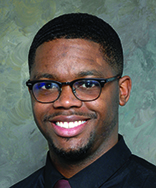 Through Hood’s alternative spring break program led by Rev. Beth O’Malley and former Director of Diversity and Inclusion Travis Eichelberger, Stubbs visited North Carolina to stay on the grounds of one of the first historically black colleges and universities (HBCU). He and his group participated in caring for the facility while learning its history and also went to local schools where they served as teachers’ assistants for the day.
Through Hood’s alternative spring break program led by Rev. Beth O’Malley and former Director of Diversity and Inclusion Travis Eichelberger, Stubbs visited North Carolina to stay on the grounds of one of the first historically black colleges and universities (HBCU). He and his group participated in caring for the facility while learning its history and also went to local schools where they served as teachers’ assistants for the day.
What HIP had the most impact on you as a student?
Out of all the HIPs I’ve experienced at Hood, the most impactful had to be my spring break visit to North Carolina with Rev. Beth and Travis Eichelberger. We stayed on the grounds of one of the first HBCUs. There we participated in caring for the facility while learning its history. We also went into the local town and acted as a teacher’s assistant for the day. Those were the nicest kids I’ve ever met.
How did the HIP impact you or help you get to where you are today?
This HIP impacted me because not only did it give me history of my people, it opened my mind and heart to all the different ways I could offer help to those in need. It helped me refocus so that I am able to dedicate my all to achieve any task.
How did you find out about the HIP opportunity?
Travis personally reached out and recommended it. A kid from Baltimore. Never been down south. It was a great opportunity for me to explore while learning to put myself aside to help others.
What was the best or most important thing you learned?
The best thing I learned was selflessness. Everything isn’t about me and I think we were there to pay it forward. Help the next one up.
Why do you believe it’s important for all students to have access to HIPs?
HIPs are important because as college students, we can get weighed down with our own stuff. We live in a microcosm centered around balancing grades and fun. But with HIPs, you get to see that, even though we have to be focused for those four years at Hood, the world is still moving around us. So we should stay informed, stay engaged and try our best to leave an impact. Even if it doesn’t change the whole world, that one interaction could change someone’s world.
 After being involved in electoral politics in Frederick County for several years before attending Hood, an internship with U.S. Senator Barbara Mikulski led Knoll to Capitol Hill, where he’s currently the defense policy adviser for Senator Chris Van Hollen.
After being involved in electoral politics in Frederick County for several years before attending Hood, an internship with U.S. Senator Barbara Mikulski led Knoll to Capitol Hill, where he’s currently the defense policy adviser for Senator Chris Van Hollen.
What HIP had the most impact on you as a student?
My internship in the office of U.S. Senator Barbara Mikulski had a significant impact on my personal and professional growth.
How did the HIP(s) impact you or help you get to where you are today?
Capitol Hill is a unique work environment, so time on the Hill is valued as much if not more than education or outside work experience. For that reason, an internship is generally seen as a prerequisite to being hired for most entry-level positions. I did not go straight from my internship to full-time employment on the Hill, but my previous experience as an intern for Senator Mikulski was a significant factor when I successfully applied for a position with Senator Van Hollen.
How did you find out about the HIP opportunity?
I had been involved in electoral politics in Frederick County for several years before I came to Hood, and based on that experience one of my professors recommended I look into internships with Maryland’s Congressional delegation.
What was the best or most important thing you learned?
Senator Mikulski had twelve principles that guided her work. All new interns and staff received a small green card with "BAM's principles" inscribed on it. The ones that have stuck with me are "do not explain an abstraction with an abstraction," "we cannot guarantee an outcome, but we can guarantee an effort," and, in classic Barbara Mikulski fashion, "just move it."
Why do you believe it’s important for all students to have access to HIPs?
As someone who learns better from discussion and experience than reading and lectures, I understand that access to these opportunities is critical. And in the case of internships, it means a foot in the door at companies and organizations looking to hire recent graduates. That said, access requires affordability. On Capitol Hill, aspiring staffers work for months or years with little to no pay in one of the most expensive cities in the country, hoping to secure a job that will still leave them spending 50 percent of their income on rent. This is not unique to Congress. It disadvantages those who do not come from money and perpetuates inequality. If we want everyone to have access to these opportunities, interns must be paid fairly for their work.
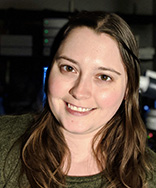 Little participated in Hood’s Summer Research Institute, conducting research in Hood’s chemistry department as well as at NIST (National Institute of Standards and Technology). She credits the experience as one of the biggest reasons she was accepted into her graduate program at the Johns Hopkins Bloomberg School of Public Health.
Little participated in Hood’s Summer Research Institute, conducting research in Hood’s chemistry department as well as at NIST (National Institute of Standards and Technology). She credits the experience as one of the biggest reasons she was accepted into her graduate program at the Johns Hopkins Bloomberg School of Public Health.
What HIP(s)—high impact practice—had the most impact on you as a student?
I worked over the summer after my junior year through Hood's Summer Internship Program. During my internship, I was able to do research in the chemistry department as well as at NIST (National Institute of Science and Technology).
How did the HIP(s) impact you or help you get to where you are today?
The internship had a huge impact on me. I was able to see how a real lab functions, and how much effort goes into a research project. It was my first opportunity to see what a research scientist's day looks like. I was able to see firsthand how work in a lab gets turned into a published paper. It convinced me that I wanted to go into research after graduation, and get my Ph.D. Having prior research experience was critical for me getting additional internships my senior year, and eventually getting into my graduate program. The experience also taught me how to collaborate and work within a group.
What was the best or most important thing you learned?
I learned a lot during the internship, so it’s hard to pick the most important thing. It would probably be just learning how much I loved doing research.
Why do you believe it’s important for all students to have access to HIPs?
HIPs are so important for students! They can change the entire course of a student's future career and life. With internships, you get the opportunity to try out a job field and learn skills you don't necessarily learn sitting inside a lecture hall.
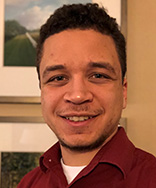 Thanks to participation in the Maryland Student Legislature as well as two internships, one for a political campaign and one for a congressional office, Graham went straight from recent graduate to a full-time campaign manager for a gubernatorial campaign in Cleveland, Ohio. Now, he’s working as the regional transportation planner for a government agency in Kentucky.
Thanks to participation in the Maryland Student Legislature as well as two internships, one for a political campaign and one for a congressional office, Graham went straight from recent graduate to a full-time campaign manager for a gubernatorial campaign in Cleveland, Ohio. Now, he’s working as the regional transportation planner for a government agency in Kentucky.
What HIP(s) had the most impact on you as a student?
During my time at Hood, I was able to receive academic credit for multiple out-of-classroom experiences. In the Maryland Student Legislature, I was able to learn about the legislative process firsthand while also gaining valuable connections and leadership experience. I was also able to receive academic credit for two internships, one for a political campaign and one for a Congressional office, which were both incredibly impactful while pursuing my Political Science degree. Being able to sit in and contribute in the day-to-day operations of campaigns and government offices allowed me to have a unique and eye-opening insight that I wouldn’t have had otherwise just from formal classes.
How did the HIP(s) impact you or help you get to where you are today?
Many employers look for additional experience for entry-level jobs after college. By engaging in multiple HIPs throughout my college career, I was able to gain that valuable experience and build a strong list of references while still being a student. Less than a week after I graduated in May 2018, I was offered a full-time position to be the Campaign Manager for a gubernatorial campaign in Cleveland, Ohio, which was only possible thanks to the campaign experience I had gained in HIPs. Even now, in my second job post-college as the Regional Transportation Planner for a governmental agency in Kentucky, I was still able to use the references I had gained in HIPs from my time at Hood, which directly contributed to me being offered the position.
Why do you believe it’s important for all students to have access to HIPs?
HIPs were undoubtedly some of my most memorable learning experiences in college, and perhaps the only learning experiences I had which directly and positively impacted my career after I left Hood. Finding a job after college is hard. For degrees like Political Science, it’s an incredibly competitive endeavor as well. By engaging in multiple HIPs at Hood, students earn academic credit, receive once-in-a-lifetime learning experiences, and automatically make their resumes stand out from the competition. They prove that sometimes, you really can learn more outside a classroom than inside a classroom.
What was the best or most important thing you learned?
I think that above all, the most important thing that I learned in my experiences was how people think about government. You can learn a lot from data and studies and surveys and lessons, but having opportunities to speak with people one-on-one was a completely transformative experience. I still remember some of the conversations I had with voters, constituents, and citizens about government and policy, and it allowed me to strengthen and develop customer service and communication skills that I use at work every single day.
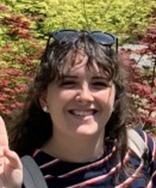 Emory, a double major in Spanish and global studies, studied abroad first in Seoul, South Korea, with the three-month Bahrom International Program and then for a semester in Seville, Spain, with the Council on International Educational Exchange. She went on to earn a Fulbright scholarship to teach English in Madrid, Spain, and is currently teaching in Japan.
Emory, a double major in Spanish and global studies, studied abroad first in Seoul, South Korea, with the three-month Bahrom International Program and then for a semester in Seville, Spain, with the Council on International Educational Exchange. She went on to earn a Fulbright scholarship to teach English in Madrid, Spain, and is currently teaching in Japan.
“Study abroad is more than just getting to travel. It is learning about the culture of a place, meeting the people, and integrating into that society to establish yourself, even if it is just for a short while. Although I only spent 1 month in Seoul, South Korea, I gained so much knowledge about Korea, friendships that will last me the rest of my life, and a confidence in myself that I didn’t know I needed. Just one month later, I was off to study abroad for a semester in Seville, and that experience really changed my life. I fell in love with Spain through my experiences with my host family (who I am still in touch with today and have visited twice in the years after studying abroad), and just from walking to class every day in a city that is hundreds of years old, with so much history and beauty. I was able to improve my Spanish to a level much higher than when I had first arrived as well. I can go on and on about every detail and experience that made me love these places, but the important thing is how they influenced my future. Once I was back at Hood, I was determined to work hard in order to find work abroad after graduation. Since I enjoyed Spain so much, I applied for a Fulbright Scholarship to teach English in Madrid, Spain for one year, which I received. I stayed in Madrid for two years total teaching English. After my time there, I decided to head East with the JET Program to teach English in Japan. I am currently in my second year in Kagoshima, Japan teaching English to high school students. I couldn’t have gotten here today if it wasn’t for those first experiences I was able to have at Hood College!”
 Nguyen, who earned a $10,000 Davis Projects for Peace grant, spent the summer of her junior year in her home country of Vietnam working with victims of Agent Orange. Her “Foundation of Hope” project was geared toward helping children with developmental disabilities caused by the chemical that was used by the U.S. military during the Vietnam conflict to defoliate forests, which is still having detrimental effects on people there.
Nguyen, who earned a $10,000 Davis Projects for Peace grant, spent the summer of her junior year in her home country of Vietnam working with victims of Agent Orange. Her “Foundation of Hope” project was geared toward helping children with developmental disabilities caused by the chemical that was used by the U.S. military during the Vietnam conflict to defoliate forests, which is still having detrimental effects on people there.
What HIP had the most impact on you as a student?
I received the Davis Projects for Peace grant during my junior year at Hood.
How did the HIP impact you or help you get to where you are today?
The project required an immense amount of work from the beginning at research stage to the end when I had to consolidate all receipts and documentation to report back. While I was the only person behind the proposal, I couldn’t have done it without my supervisors and 18 hardworking volunteers. The project gave me a unique opportunity to bring my idea to life while pushing me to be a leader and a team player.
Why do you believe it’s important for all students to have access to HIPs?
I think having access to HIPs will significantly improve students’ college experience, making it truly 4 life-changing years. HIPs is a great resource to help students make the most out of their college education. I strongly believe that students who have done HIPs are more active on campus, more likely to participate in other extra-curricular activities such as college organizations, internships, volunteering, etc.
What was the best or most important thing you learned from your experience?
The most important thing I learned from the project is to live with love and compassion. I remember the last day of the project that summer, I was bandaged all over due to an unfortunate motorcycle crash a few days earlier. The wounds were not that bad but the amount of gauze made it look severely worse. All of the children circled around me and some said if I were to lose my legs, they would take care of me. A very shy and nonverbal girl sat walked over and started crying; I thought someone bullied her really badly because I'd never seen her cry but as it turned out, she was crying because she saw that I was hurt. The day wasn't a defining moment of my project or what made it all worth it but it was the day that I realized everyone is capable of love and I owe it to all of the children whose disabilities are way worse than my scrapped knees to lead my life with more compassion.
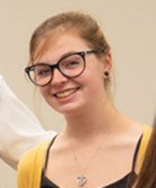 Ricker recently completed an internship at the United Way of Frederick County and hopes to have a career in nonprofit work one day.
Ricker recently completed an internship at the United Way of Frederick County and hopes to have a career in nonprofit work one day.
What was your role at your internship?
At United Way, I have been the Community Impact intern with Malcolm Furgol, the director of Community Impact. My internship included many duties, including working with committees and coalitions United Way is involved in, aiding in the grant process (both completing grants and reviewing submitted grants) and working closely with Eileen Mitchell for the 2020 Frederick Census campaign and outreach. I helped a lot with coordinating meetings and taking minutes during meetings. I think I was most nervous scheduling and meeting with elected officials Kai Hagen, Jessica Fitzwater, and Jerry Donald downtown at Winchester Hall. It was crazy and exciting to meet some of the people working so hard to bring effective change and a build a stronger community.
What are your career goals? Did your experience help you discover or reaffirm those goals?
Coming into this internship my career goal was ambitious, to one day start my own nonprofit. After interning here for a semester, I’ve learned that starting a nonprofit is not simple. So much work goes into even daily tasks at a nonprofit. I still think I am very interested in getting involved in more nonprofit work still, whether through my career or volunteering. Interning at United Way helped me learn so much more about working with a nonprofit than I ever imagined I would learn. Everyone there was so dedicated to making the organization strong and you can tell everyone there cares about their community. This experience definitely got me closer to reaching my goals, I got so much incredible experience from this position and met so many people working to help every member of Frederick County, from children in need to adults working on goals like being able to purchase their first home. I got to see a diverse range of the nonprofit world and the experience was great.
What was the most important thing you learned at your internship?
The biggest lesson for me at the United Way was the importance of community and working together to facilitate change. During my internship I learned a lot about collective impact, the practice of using many key community players, organizations, and stakeholders to work together on long-term projects aimed at implementing positive and lasting change for a community. Working together with community leaders of different backgrounds brings a wider knowledge to the challenge at hand and helps in advocating for people of all different backgrounds. I think it was important for me to learn how much change you can affect when you bring more people to the table, know the people in your community and embrace the people who are around you.
What are your plans for the future?
In the future I definitely plan on going to graduate school, but I’d like to work and get more experience and work to make more money to help get me there. I have thought a lot about what I want to do next, whether I work more with nonprofits, focus more in the social work field, or find a completely different path. Overall, I’m feeling more confident after spending time at United Way and taking the opportunity at Hood to do an internship.
“Through Hood's connections I was able to get the internship at Northrop Grumman as a business management analyst and from there directly to the job. I'm looking forward to continuing to seek opportunities within the company and continue to grow personally from the experience.”
—Elias Nicholson '19
What Hood students’ internship hosts are saying
“I’ve had the pleasure of employing Hood students in the past and was only impressed with their work ethic and professionalism. I fortunately was able to witness these talented young professionals grow and develop their skillsets, while adding substantial value to the company. In my experience, Hood students are a reliable, dependable, and innovative addition to any workplace.”
—Jack Marti, Human Resources Manager at Go Ape!
“The interns we’ve selected from Hood College have all been ready to put their textbook knowledge to use in a professional setting with minimal direction. They are eager to learn and are thankful for the opportunity, easily recognized by their work ethic. Currently, we only have 1 internship available each semester but given the high caliber of interns we’ve received from Hood, the selection process is always the most difficult task on our end!”
—Bethany S. Lord, Vice President of Human Resources at Woodsboro Bank
“The Hood College interns who I have worked with at United Way of Frederick County over the last 6 years have consistently impressed me in their passion and eagerness to learn. I always learn just as much from them as they do from the experience.”
—Malcolm Furgol, Director of Community Impact at United Way of Frederick County
“The interns from Hood show a great deal of professionalism and enthusiasm to learn and master new and challenging tasks. Working with students that have been taught the value of adaptability eases the transition from student to employee.”
—Jessica L. Smith, Operations Manager at Leidos
Are you ready to say Hello?
Choose a Pathway
Information will vary based on program level. Select a path to find the information you're looking for!
